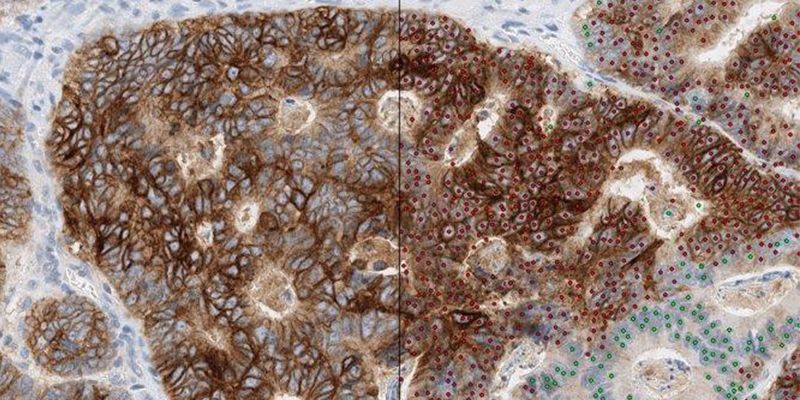
A test which uses artificial intelligence (AI) to measure proteins present in some patients with advanced bowel cancer could hold the key to more targeted treatment, according to new research.
A team at the University of Leeds collaborated with researchers at Roche Diagnostics to develop the technique, which will help doctors and patients to decide on the best treatment options.
They used samples from a previous trial funded by Cancer Research UK to look at the levels of two proteins, known as AREG and EREG, which are produced by some colorectal cancers.
Algorithms driven by AI enabled the researchers to show that patients with higher levels of these proteins received significant benefit from a treatment which inhibits a different protein involved in cancer cell growth, known as EGFR. Equally important was evidence that patients with low levels of the proteins did not benefit from the treatment.
“It is becoming increasingly difficult for patients and their doctors to choose the treatment that’s right for them. This test will help patients navigate this decision-making process more easily.”
Currently, anti-EGFR treatments are only given to patients with advanced, incurable bowel cancers. The researchers hope their algorithm could be used in the future to identify patients in the earlier stages of illness who could also benefit from the drugs.
Lead author of the report, Dr Christopher Williams, from the University’s Division of Pathology and Data Analytics, said: “As more treatment options become available for advanced colorectal cancer, it is becoming increasingly difficult for patients and their doctors to choose the treatment that’s right for them. This test will help patients navigate this decision-making process more easily.”
Today’s publication of the findings in the journal, Clinical Cancer Research, is timely as it coincides with Bowel Cancer Awareness Month in the UK. The study was funded by Innovate UK and Roche Diagnostics as well as Yorkshire Cancer Research. It was part of a programme of work in this field being conducted by the National Pathology Imaging Co-operative.
The report’s senior author, Kandavel Shanmugam, who is a senior director of medical innovation at Roche Diagnostics, said: “As increasing numbers of complex tests are developed to target the right cancer treatments to the right patients, developing streamlined methods for delivering test results will be essential to improve cancer care.
“By using artificial intelligence to semi-automate the test process, we anticipate it may be easier for results to be delivered to patients faster to better influence treatment decisions.”
Roche is a global pioneer in diagnostics and pharmaceuticals focused on advancing science to improve people’s lives.
National Pathology Imaging Co-operative, NPIC (Project no. 104687) is supported by a £50m investment from the Data to Early Diagnosis and Precision Medicine challenge, managed and delivered by UK Research and Innovation (UKRI).
Further information:
The research, Artificial intelligence-assisted amphiregulin and epiregulin immunohistochemistry predicts panitumumab benefit in RAS wild-type metastatic colorectal cancer, is published 22 April 2021 in the journal, Clinical Cancer Research. DOI: 10.1158/1078-0432.CCR-21-0120
The main image is of a colorectal cancer. To the left of the black line is how the image would appear down a microscope. The image to the right of the line is how it would look once the artificial intelligence algorithm has been used to label the cancer cells with dots. The red dots highlight the cells which contain the EREG protein and the green dots are EREG negative. Image copyright Roche Diagnostics.